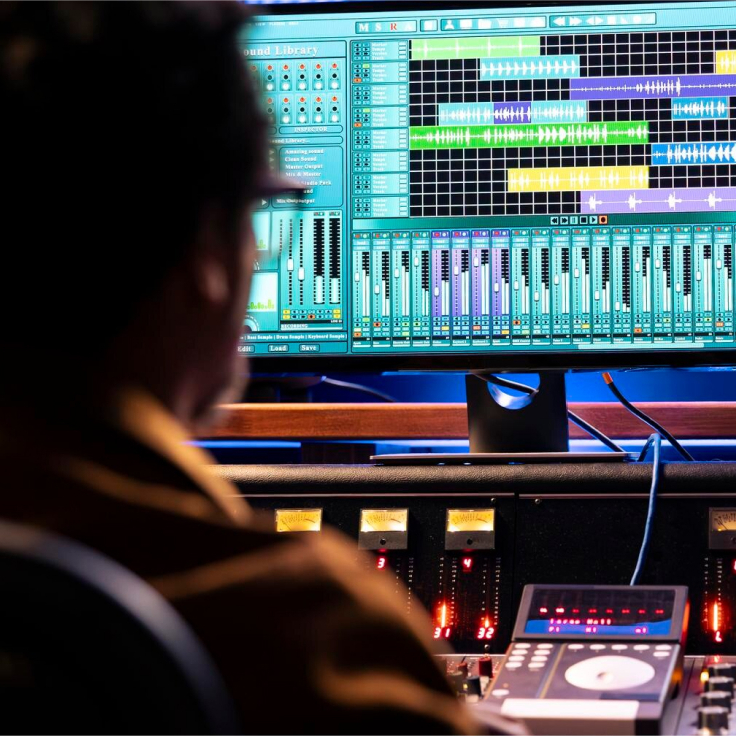Accessible Services
Breathe Life Into Your Content for All AudiencesTell your stories in a more accessible way while complying with all international standards.

About Our Accessible Services
Millions of people worldwide suffer from some type of hearing or visual impairment. Communication support services, such as closed captioning, subtitles for the deaf and hard of hearing (SDH), audio description or sign language interpreting make it easier for people with a hearing or visual impairment to integrate and enable them to fully enjoy multimedia content for cinema, TV and VOD platforms, video tutorials, online training platforms, corporate videos, conferences, or virtual meetings and discussions, among others.
Seprotec provides specific accessibility services by adapting multimedia content and making it more inclusive to the entire audience and in doing so, complying with international regulatory parameters.
-
Closed captioning (CC)
Closed captions are texts of a video soundtrack that appear while it is being played. What makes closed captions different from subtitles is that, in addition to the dialogs, they include descriptive information about who is talking, as well as about any relevant sound that might help the viewer follow the scene, such as laughter, applause, backing music or the lyrics of a song playing in the background, among others.
Closed captions make content understandable to people with hearing difficulties and improve their experience as viewers. In many countries closed captions are mandatory by law. -
Subtitles for the deaf and hard of hearing (SDH and HoH)
Subtitles for the deaf and hard of hearing (SDH and HoH) differ from closed captions in several ways. The most important difference lies in the encoding system used and, therefore, in the possibility of playing the content on high-definition devices.
In the same way as closed captions help people who are not deaf or hard of hearing, SDH make the content more accessible for a wide range of people, because: They improve the understanding of people who do not speak the content language fluently They help those viewers with an attention deficit disorder or cognitive impairment when it comes to concentrating on the video They help viewers to better understand people with strong accents They improve the watching experience in environments that make listening difficult -
Sign language
Sign language is the language used by deaf people and people who live or associate with them. Sign language has its own grammatical structure and vocabulary, so it is not just a translation of spoken language but is a language in its own right with its own system – also differing by region, e.g. American Sign Language (ASL) in North America and British Sign Language (BSL) in the United Kingdom.
Sign language interpreters work live or in real time on numerous occasions and also in recording studios as an alternative to the subtitling of multimedia content. -
Audio description
Audio description is a form of narration used for providing information about key visual elements of audiovisual content that helps blind and visually-impaired consumers. It provides a detailed description of the visual content and is presented in narrations that are generally inserted during natural pauses in the soundtrack and, sometimes, during the dialog if this is considered necessary, thus giving people with a visual impairment the opportunity to fully enjoy performances, movies, the visual arts, exhibitions, and cultural events.
Key Benefits

Inclusivity
By integrating accessibility solutions into your communication and content strategy, you ensure that everyone feels included.

Brand image
Making your services and information available to everyone increases the positive perception of your brand, leading to a better brand image.

Comply with regulations
There are a large number of national regulations in the workplace, but also for the provision of services that companies must comply with.

Why Choose Seprotec?
With more than 25 years of experience in providing language solutions, we have extensive expertise in making content available and understandable for all audiences – across a wide range of use cases.
-
Our language specialists and interpreters ensure that your content and messages are understandable for everyone.
-
We use state-of-the-art technology to provide innovative solutions that ensure your content is accessible – for an inclusive UX.
-
We provide our customers with comprehensive linguistic services in a wide range of industries.
-
We work according to strict quality and information security standards compliant with relevant ISO certifications.
Seprotec Multilingual Solutions is a full-service translation, localization, and interpreting company. We translate, localize, and interpret into and from over 220 languages, including all the major European, Asian, American, African, Indian, and Middle Eastern languages.
Rest assured that your localization projects are in good hands with us, and you will receive the necessary attestations once the localization is complete.
Seprotec’s Localization Quality
Seprotec provides ISO certified localization services for leading companies in several industries. As part of our commitment to guaranteeing the quality of our services and mindful of the importance of the environment have, in all of our activities, upheld a Comprehensive Quality and Environment Policy, which is the basis of our management system.
Our efforts have been recognized by the International Standards Organization (ISO) and awarded certifications under the requirements of the following standards: ISO 9001 (Quality Management); ISO 17100, which is specific to translation services; ISO 18587, specific to machine translation post-editing; ISO 13485, specific to medical devices; ISO 14001 for environmental management, and ISO 27001 for information security management systems.
 Learn More
Learn More

Frequently Asked Questions
-
What are language access services?
Language access services refer to the provision of communication tools and resources to ensure that individuals with limited English proficiency can have equal access to information and services. This can include the use of technology such as Zoom or telephonic interpreter services when an in-person interpreter is not available.
In compliance with national human trafficking and federal homeland security regulations, organizations must provide inclusive communication for all individuals, regardless of language barriers. Language access services ensure that individuals can access important information and services, such as guidance documents and reports, in their preferred language.
By working with language service providers like Seprotec, organizations can ensure availability of interpreters and translators to assist with any language requirement that may arise. -
How can you make content accessible for people with disabilities?
Accessibility solutions must include a focus on making content inclusive for people with diverse disabilities. This means considering the communication needs of those with impaired hearing, speaking, seeing, and understanding. Whether you are a customer or an employee, it is important to ensure that verbal and non-verbal communication is enabled and information is understandable for everyone.
Language services play a big part in this and provide some best practices. These can include, for example, the provision of transcription and closed captioning services, partly with the support of AI, to provide a written record of spoken text in videos or audio content. Vice versa, text-to-speech, voice-over or dubbing services help people to understand written text in eLearnings or videos.
Providing interpreting services can also make information accessible to people who do not understand the language or, in the case of sign language, to people with a hearing impairment.
The use of plain language on the website or other informative material can also help to ensure that information is understandable for people who are mentally impaired or have limited language skills in the official languages.
Offering multilingual content in general is key in a globalized world. By translating your marketing and product material and hiring multilingual staff for your customer service you make sure you effectively communicate seamlessly with non-native speakers.



















